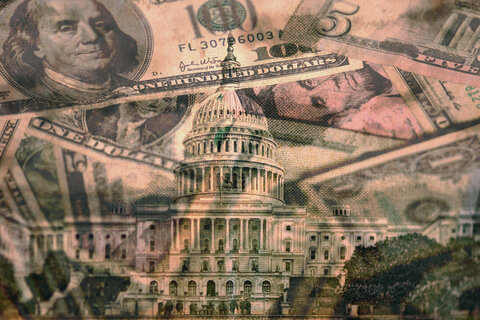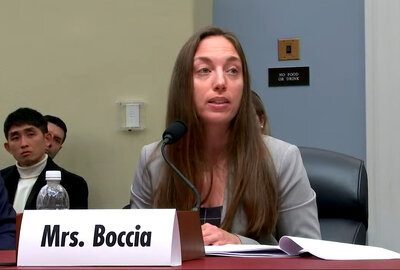
While Fed Chair Jerome Powell made the rounds on Capitol Hill this week, discussions about the Federal Reserve’s expectations for inflation have once again come to the forefront. Unsustainable government spending is raising inflationary pressures with potentially devastating consequences for the US economy. In this context, the belief that debt doesn’t matter, especially championed by proponents of Modern Monetary Theory (MMT), appears more detached from reality than ever.
This notion, prevalent on the political left, claims that a government that issues its own currency can never run out of money in the same way a household or business might. Advocates argue that such a government can always print more money to pay off its debts, thereby sidestepping any constraints imposed by traditional fiscal discipline. While this might sound appealing, it’s a classic example of what sociologists call a “luxury belief”—an idea that is primarily held by those insulated from its real-world consequences.
“We are a sovereign currency, we can print all the money we want”—former House Budget Committee Chair John Yarmuth (D‑KY) at a congressional hearing.
Luxury beliefs, as sociologist Rob Henderson describes, are ideas that confer status on the rich while often burdening the less fortunate. The concept has traditionally been associated with cultural and social norms, but it applies equally well to economic theories like MMT. Proponents of this “magic money” theory, often shielded by their own economic stability, pay too little heed to how elegant theories on paper can lead to catastrophic outcomes in the real world.
A key argument against MMT’s false promise is that printing money for the sake of financing government spending leads to inflation. When a government prints money to cover excessive spending, it increases the money supply without a corresponding increase in goods and services. This creates an imbalance between available resources and the money available to purchase them, with the result being inflation—an increase in the price level that erodes the purchasing power of money. For the wealthy, this might mean adjustments to their investment portfolios or higher prices on certain items. For the poor and working class, however, inflation can be devastating.
Inflation Disproportionately Causes Hardship for Lower-Wage Workers
Inflation hits the most vulnerable the hardest. As FREEOPP has detailed in a recent study, inflation disproportionately affects the poor by increasing the cost of essential goods and services that they consume by more than is the case for the basket of goods enjoyed by wealthier individuals. This compounds low-earners’ financial struggles and exacerbates inequality. According to FREEOPP, “If we examine the absolute impact of inflation, we find that from 2004 to 2020, earners in the bottom decile experienced inflation that was 71 percentage points higher than for the top decile, on a compounded basis.”
In fact, as Timothy Carney, a scholar at the American Enterprise Institute, has pointed out, super-wealthy individuals, who rely less on their incomes, benefit from inflation as the value of their assets, such as homes and stocks, increases.
When those Americans living paycheck to paycheck see their costs of living rise without a commensurate and immediate increase in their incomes, this creates additional hardship. Essentials like food, housing, and transportation become more expensive, pushing them further into poverty and potentially leading to the need for additional borrowing, often at high rates, whether that be via credit cards or alternative financing methods. Unlike the wealthy, who can hedge against inflation with investments in assets like real estate and stocks, lower wage-earners, especially those living on current wages alone have more limited options to protect their finances against value erosion from inflation.
Elites Are More Insulated from Inflation
MMT’s proponents often come from academia, think tanks, and well-off political circles, environments where they are more insulated from the impacts of inflation. These individuals can afford to hold such beliefs without suffering the devastating consequences that lower-wage earners face when prices rise. Their luxury belief that the government can just print more money to finance deficit spending is rooted in a world of theoretical economics rather than the lived realities of everyday Americans.
This disconnect highlights a broader issue within economic policy debates. The luxury of academic and theoretical detachment allows influential voices to promote ideas that would be perilous if enacted. The consequences of such policies are less often borne by their proponents but by those least equipped to manage them—poorer working-class Americans.
Veronique De Rugy, a scholar with the Mercatus Center at George Mason University, recently wrote about this disconnect when it comes to industrial policy debates, arguing that “tariffs and industrial policy arguments [are] self-serving and counterproductive, designed to elevate one’s personal status without regard to the practical consequences for those with less power and privilege in the world.” Her treatment of the issue inspired this post.
Believing that government debt doesn’t matter, so long as this debt is held by a country that generates its own currency, is akin to ignoring economic fundamentals. Historically, unchecked money printing has led to hyperinflation and economic collapse in countries like Zimbabwe and Venezuela. The United States, with its vibrant economy and strong institutions, might not face such extreme outcomes, but the risk of significant inflation remains elevated if Congress continues reckless deficit spending. The current fiscal outlook is highly unsustainable, and the chickens will eventually come home to roost.
As Dominik Lett and I have recently warned, “If Congress leaves spending corrections to the last minute, legislators may perceive the draconian fiscal consolidation necessary to bring debt under control as less desirable than monetizing the debt. In such a scenario, printing more money might become the easiest or only politically feasible way out.”
A More Responsible Path Forward
The belief that debt doesn’t matter is a luxury belief that disregards the lived experiences of the poor and working class when inflation hits. While espousing MMT as some clever economic theory that surpasses traditional fiscal responsibility may confer intellectual and social status among certain elites, for legislators to blindly follow down the MMT path poses real dangers for those Americans most vulnerable to economic instability. Congress and the executive should prioritize fiscal responsibility and economic policies that enable prosperity for all Americans, not just the privileged few.
The 118th Congress and President Biden have squandered many chances to correct the fiscal course—from agreeing to an irresponsible debt limit deal to allowing executive spending to run amok to authorizing more money for foreign and domestic emergencies with no intention to pay it back. There’s still an opportunity for this Congress and President Biden to begin the important work of stabilizing the US debt and reducing inflationary pressures. The lame-duck period, following the November elections, might be an ideal opportunity to establish a fiscal commission to consider all the options before US legislators and propose a package that will rein in out-of-control spending and debt.
Whether US policymakers intend to follow MMT’s ill-conceived prescriptions or not, the current default option is most likely to lead us down the MMT-proposed path as autopilot spending increases consume more and more government revenue, driving up debt and increasing the likelihood of fiscal dominance in the future, where the Fed is backed into a corner of making monetary decisions to support government finances rather than to control inflation. This is a path to hardship and potential chaos we should avoid.










